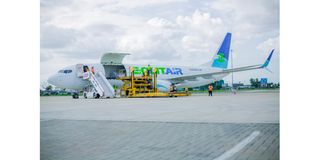Direct Dar-Dubai cargo flight set to boost trade, ease regional transport woes

What you need to know:
- The new air cargo service, operated by Tanzania’s own Xerin Group Limited, will use a B737-800 freighter with a capacity of up to 20 tonnes per trip.
Dar es Salaam. Tanzanian traders now have reason to celebrate following the launch of a new dedicated cargo flight connecting Dar es Salaam and Dubai, marking a major milestone in the country’s air transport and trade logistics sector.
The new air cargo service, operated by Tanzania’s own Xerin Group Limited, will use a B737-800 freighter with a capacity of up to 20 tonnes per trip.
The weekly flight, departing Dubai every Wednesday morning and landing in Dar at 3:00pm, before returning at 4:30pm, is expected to transform how goods move between Tanzania and the United Arab Emirates (UAE).
For years, Tanzanian traders—especially small and medium-sized enterprises—have relied on commercial passenger flights or expensive shipping alternatives to import goods from Dubai, a city known globally for its business-friendly ecosystem and wholesale markets.
"This is a long-overdue solution," said a Senior Finance Manager at the Tanzania Airports Authority (TAA), Mr Shadrack Chilongani, during the launch event held on July 2. "We’ve faced major challenges transporting perishables. With this freight service, we now have a direct, reliable route that supports both our imports and exports."
He added, “It’s not just traders who benefit. Farmers, meat producers, and exporters of fresh produce will now reach markets in Dubai and beyond in record time, with fewer losses. This is a win for our economy.”
With air freight in place, Tanzanian producers now have greater opportunities to export high-value, time-sensitive goods. From horticulture to seafood and processed meat, a new market window has opened.
“This gives farmers confidence,” said Mr Chilongani. “They can now invest in higher-quality production knowing the market is reachable. It’s a value chain boost—right from the farms to the shelves in Dubai.”
According to data from the Tanzania Investment Centre (TIC), trade between Tanzania and the UAE has been growing steadily, with bilateral trade volume crossing $2.3 billion in 2023.
The UAE is among Tanzania’s top five trading partners globally, importing gold, food, textiles, and agricultural produce while exporting electronics, oil products, and construction materials.
"With direct cargo flights, that trade figure is poised to grow even further," said economist and logistics expert Dr Edwin Mrema. "This is not just a flight; it’s a trade corridor."
He added that reducing transit times and lowering costs would allow Tanzanian businesses to operate more competitively.
"Many traders have been paying premium rates to move goods via third countries or mixed cargo-passenger flights. That’s now changing."
The launch of the cargo service also aligns with Tanzania’s broader ambition to make Dar es Salaam a regional logistics and trade hub. The government has invested heavily in expanding Julius Nyerere International Airport (JNIA), upgrading its cargo terminal, and enhancing customs systems to make freight handling faster and more efficient.
Moreover, the ongoing development of the Standard Gauge Railway (SGR), linking Dar to central and western Tanzania—and eventually to neighbouring countries such as Rwanda, Burundi, and the DRC—will offer seamless air-to-rail connectivity.
“This is the integrated infrastructure we’ve been waiting for,” said Dr Mrema. “When cargo lands in Dar, it shouldn’t stay there. It should easily move to Arusha, Bukoba, Lubumbashi, or Kigali. This flight opens up that chain.”
Dubai continues to serve as one of the most strategic trade hubs in the world. Its proximity to Asia, Europe, and Africa, plus its favourable tax regime and advanced logistics systems, make it ideal for Tanzanian traders seeking goods or exporting produce.
CEO of Xerin Group, Mr Hussein Jamal, emphasised that the new flight was not just about transportation—but also about empowering businesses.
“We’ve spoken to SMEs, manufacturers, and exporters in both Tanzania and the UAE. One message stood out—the need for a dedicated, timely, and reliable cargo solution,” he said. “This is a bold step to unlock trade opportunities that were limited by logistical constraints.”
Mr Jamal also revealed plans to expand operations beyond Tanzania. “We’re eyeing all Gulf countries, and we plan to use Dar as a central node to serve East and Central Africa. This includes an additional 10-tonne freighter that will distribute cargo from Dar to other regional capitals.”
The development also reflects Tanzania’s vision under the national industrialisation and export agenda. With agriculture still employing over 65 percent of the population, access to fast export routes is critical for inclusive growth.
Though the cargo flight will initially operate weekly, Xerin Group says flight frequency will increase in response to demand.





